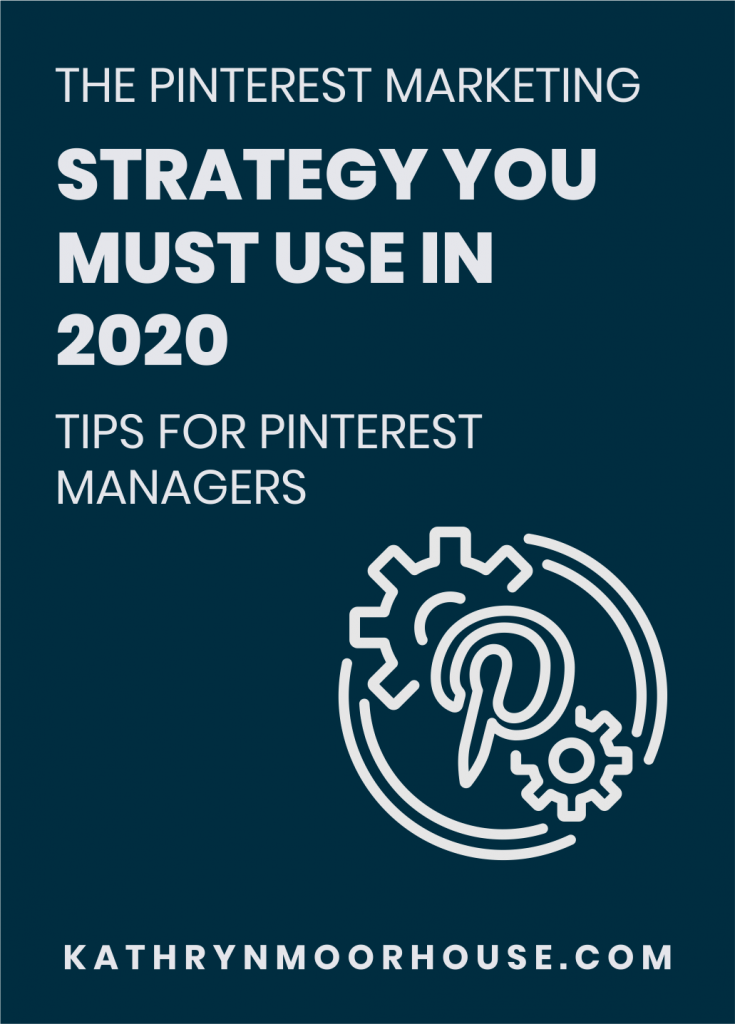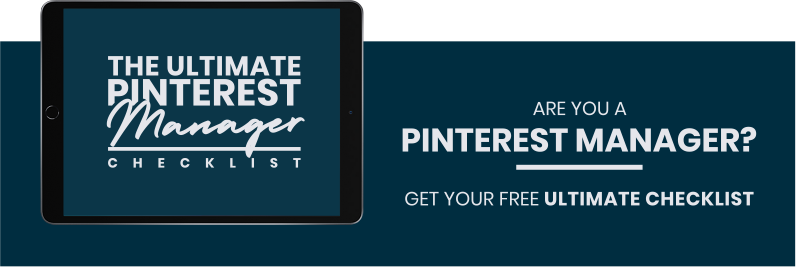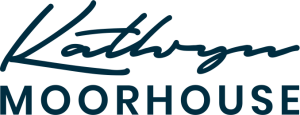Keep up to date with all the Pinterest Management tasks you have for your clients with The Ultimate Pinterest Manager Checklist!
“If Google and Instagram had a baby…we’d call it Pinterest”
– Kathryn Moorhouse
Yep, I quoted myself because I’m fancy like that 😎 and also I say this ALL THE TIME.
It’s the easiest way to describe just how powerful Pinterest really is.
Pinterest has the amazing search engine functionality like Google, with the beautiful visual aesthetics of Instagram.
Of course Pinterest likes to take it a few steps further with personalization for each unique user and visual search with your camera – cause they’re awesome and they want to give Pinterest managers sleepless nights with all the new features 😭!
Kidding…well no not really. 🤷

When it comes to strategically using Pinterest in 2020 there is one strategy that you MUST follow.
It’s not even an option to ignore it any longer. It’s the foundation of what Pinterest is and it’s the cornerstone strategy I teach my students to use for their clients.
The Pinterest marketing strategy you must use in 2020 is Pinterest specific search engine optimization.
That basically means mastering Pinterest keywords and the Pinterest search engine as well as knowing how to use keywords to your advantage on Pinterest – beyond the basics of putting keywords in your pin descriptions.
If you’re skeptical, I get it…
It’s perfectly reasonable to wonder if investing your time in Pinterest Keywords can actually produce the kind of results you want to get for yourself and your clients.
I wouldn’t expect you to dive in headfirst without a little proof that Pinterest keyword research is the cornerstone strategy you should be using on Pinterest in 2020.
So allow me to prove to you why it should be YOUR main strategy.
Pinterest uses keywords for:
– Promoted pins click through rate prediction
– Home feed creation & ranking
– Related Pins creation & ranking
– Search result retrieval & ranking
– Board suggestions for new Pins
– Detecting unsafe content on Pinterest to name a few.
Since Pinterest is made up of different “feeds” it’s important to realize that the pins they choose to showcase in those feeds are selected and ranked using keywords.
When you visit your home feed on Pinterest have you ever wondered how they figure out what pins to showcase?
When you’ve searched for something on Pinterest have you ever wondered how they rank the pins in the search result?
When you enlarge a pin image and you scroll down to the related pins section have you ever wondered how they figure out what pins to put there and how your pins (or your client’s pins) could show up there?
The answer: Keywords
When creating those different feeds and ranking pins within those feeds they’re relying on keywords to help them do this.
You’ve probably heard that you need to include keywords in your pin descriptions to help your content show up in search results but that’s just the beginning.
Pinterest can see objects that are in your pin images.
Yep, they can see that acai bowl with the napkin and spoon and they can use that information to showcase that pin in any relevant acai bowl searches.
BUT…how do they do that?
Short answer: keywords.
No, they don’t have one person sitting sifting through your pin images saying, “oh yes that’s an acai bowl with coconut shavings and a drizzle of maple syrup”. I mean if they did, I’d take that job but I’m pretty sure with all those recipes out there I’d spend most of my day hungry!
I share more about this in my mini-course Simplifying Pinterest Keywords™ (SPK). Nope I don’t talk about how I’d take that job at Pinterest in SPK – we stick with keywords! In SPK I want to help you dive deeper than just the basics because as you can see keywords are forming the cornerstone of feed creation, pin retrieval, and ranking across Pinterest.
Okay so now you know that Pinterest uses keywords to figure out what’s in your pin image, generate home feeds and related pin feeds, rank pins in the home feed and related pins feed and help retrieve pins for search result feeds and rank pins in those search results. Next up is the power of search.
search plays a role in the pinterest experience
One factor that will affect traffic to your website or your client’s website from Pinterest, is the Pinterest search engine.
Why? Because pinners are constantly searching.
In 2016 Pinterest said they saw over 2 billion text based searches per month and that number has been growing ever since. Pinterest also see hundreds of millions of VISUAL searches using their lens tool each month.
With SEARCH being such a huge part of the Pinterest experience it factors into the traffic you get from Pinterest.
With KEYWORDS playing a huge role in the retrieval and ranking of pins in the search engine it’s a factor you can’t ignore.
Pinterest is a visual search engine so if you’re following strategies that work with social media channels you’re missing out on the core strategy that works WITH this platform. Treat Pinterest like a search engine by focusing on Search Engine Optimization.
There are plenty of strategies you can apply to your Pinterest account including...
Your pinning schedule strategy, your pin design strategy, your content creation strategy, your promoted and organic campaigns strategy, your fresh content vs older content strategy and more.
But the one strategy you can’t ignore any longer (even if you cringe when I say it) is search engine optimization.
Pinterest IS A SEARCH ENGINE. Woah, okay I won’t shout too loudly but since it’s a search engine your main strategy needs to be optimization of your account for the search engine.
are you convinced yet?
I hope I’ve been able to help you see why Pinterest search engine optimization and keyword optimization is a cornerstone strategy you must have in the coming years.
It’s something Pinterest is diving deeper into which is why I’m teaching my students to dive deeper into it as well.
The more Pinterest uses keyword mapping to match a pin with relevant search queries, interests and feeds the more we need to focus on understanding how to leverage keywords to our advantage.
If you’re wanting to dive deeper into understanding Pinterest search engine optimization, Pinterest keyword targeting, how to get pins to rank highly under popular search terms and how to structure your Pinterest keyword research process make sure you take a look at my mini-course, Simplifying Pinterest Keywords™, I’m teaching you exactly how to do this and how to implement it for your account and your clients’ accounts.
What’s included in the perfect Pinterest SEO strategy?
1. Text based keyword optimization across the Pinterest profile
Pinterest does offer up visual search results when you type something into the search bar, however, they use text based KEYWORDS to decide what pins are most relevant to the search query. You need to focus on text based keyword optimization across your client’s Pinterest profile. That means you need to think strategically about the keywords you use in your client’s pin descriptions, board descriptions, board names, profile descriptions and pin titles.
Are you spending enough time selecting the right keywords to use across your client’s profile that will actually help their content show up in the search results? Have you taken the time to understand how Pinterest ranks pins and how keywords are associated with pins?
2. Pinterest image optimization for the Pinterest search engine
Pinterest can read the text ON your image and see the objects IN your image. They use this information to help decide where to place your pin across Pinterest.
This means you need to be selective in your image choice and in your text overlay choice. You need to optimize the image and text on the image for the Pinterest search engine.
3. Website optimization for the Pinterest search engine
The one part you may overlook when you work with Pinterest keywords and Pinterest search engine optimization is your website or your client’s website. It’s crucial that you pay attention to how Pinterest looks at your website in order to rank your pins in the search engine.
Yes, they look at your website landing page and analyze the content and the image to help them in their ranking process.
4. Selecting the right keywords that your content will be associated with for ranking and retrieval in search results and the different feeds on Pinterest
When it comes to ranking your pins in the search engine (or other feeds on Pinterest) the keywords you select to represent your pin will play a vital role in their ranking and positioning on Pinterest.
When it comes to choosing keywords for your content it isn’t just about keyword stuffing and adding in loads of keywords hoping for the best.
You need to be strategic in your keyword selection to ensure that you get the best score for that particular keyword (more about this in Simplifying Pinterest Keywords™) and end up ranking for that search term.
taking pinterest keyword targeting further
In SPK I want to help you dive deeper than just the basics because as you can see keywords are forming the cornerstone of feed creation, pin retrieval, and ranking across Pinterest.
Pinterest keyword targeting isn’t going away and it’s the Pinterest marketing strategy you’ll need to use effectively in 2020 to get traffic to your website and your client’s website.
Get started mastering Pinterest keywords with Simplifying Pinterest Keywords™!
what questions do you have about pinterest keywords?
Share your questions in the comments below so I can help you use this incredible Pinterest marketing strategy in 2020.

The Ultimate Pinterest Manager Checklist will help you stay on top of your client work so you don’t loose sleep hoping you didn’t forget anything. This checklist will take you through client onboarding, account set up, monthly maintenance and more.
After you go through it, you’ll be able to confidently provide your Pinterest Management clients with an experience they’ll rave about, knowing that you’re on track with all the tasks you need to complete.

